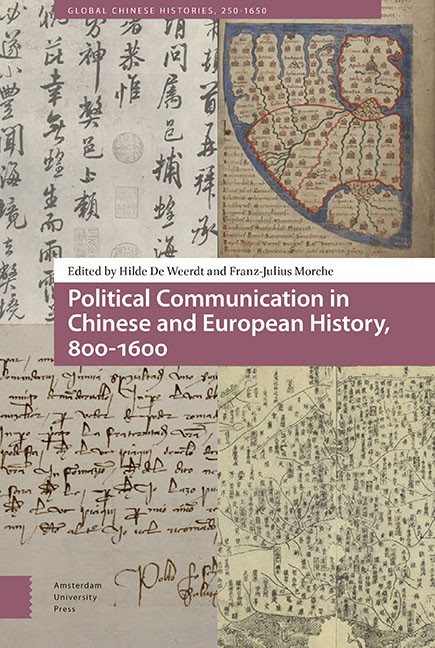Book contents
- Frontmatter
- Dedication
- Contents
- List of Figures and Tables by Chapter
- Acknowledgments
- Introduction
- Part I Communication and the Formation of Polities
- Part II Letters and Political Languages
- Part III Communication and Political Authority
- Part IV Memory and Political Imaginaries
- Epilogues
- List of Contributors
- Index
1 - Towards a Comparative History of Political Communication, c.1000-1500
Published online by Cambridge University Press: 17 June 2021
- Frontmatter
- Dedication
- Contents
- List of Figures and Tables by Chapter
- Acknowledgments
- Introduction
- Part I Communication and the Formation of Polities
- Part II Letters and Political Languages
- Part III Communication and Political Authority
- Part IV Memory and Political Imaginaries
- Epilogues
- List of Contributors
- Index
Summary
Abstract
This chapter discusses the overlapping interest in political communication and mediation in recent Chinese and European historiographies. It explores a shared trend towards the social appropriation and reproduction of central (or ‘state’) authority by various kinds of intermediaries in the late Middle Ages, and underscores the use of a comparative historical inquiry in analyzing the different modalities and effects of the social appropriation of state authority in Chinese and European history.
Keywords: political communication, mediation, literati, Catholic Church, clergy, political community
Comparisons between European and Chinese history are in danger of becoming the cliché of the global turn. Whether it is a case of comparative studies of empire, the exploration of ‘Great Divergence’, or the study of ‘Eurasian Transformations’, the choice of ‘Europe’ and ‘China’ as comparators seems inescapable. While there is some comparative work that deliberately takes a different line — Victor Lieberman's ‘Strange Parallels’ between Eurasian ‘rimlands’ would be one obvious example — it is not hard to see why discussion so often focuses on these two major centres of culture and power: there are rich Anglophone historiographies; there are equalities of scale; there is topicality; and there is a pre-existing comparative literature which inevitably raises questions for further examination. We make no apology for adding yet another layer of Chinese-European comparison in this volume. Although we shall draw on some established approaches — above all, the ground-breaking work of Shmuel Eisenstadt in the 1960s — we shall also seek to strike out in new directions.
As a starting point, we will build our comparison upwards, starting from themes that are more prominent in the regional literatures of European and Chinese history than in the comparative literature. We hope that this might help us to break free from some of the familiar repertoires of analysis — particularly the comparison of ‘states’ — and to do justice to the specificity of social experience, capturing something of the micro- and meso-levels of political life as well as the macro-level. Second, we aim to explore process more than structure or development. Like Eisenstadt, but resisting the pressure to create taxonomies, we want to get at patterns of interaction rather than grand narratives. Third, as the Introduction indicates, we want to extend our examination into periods less frequently compared.
- Type
- Chapter
- Information
- Publisher: Amsterdam University PressPrint publication year: 2021

